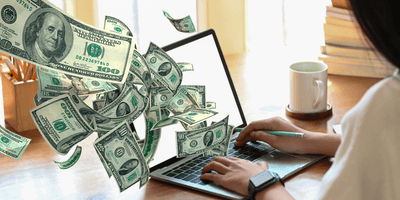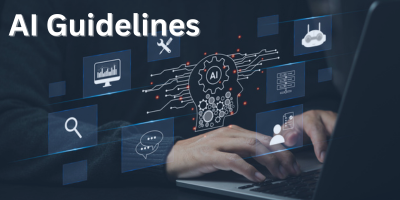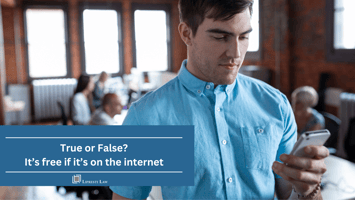AI, AI, AI. Artificial Intelligence is all we hear about these days. Ever notice that if you repeat...
When Creativity Doesn't Pay: What you Can't Copyright
Let’s face it: Even before generative AI giddily ascended from the underworld to wreak havoc in our lives, there’s a lot of content out there. Too much actually (maybe like this post?). The onslaught will only accelerate, perhaps exponentially now that the AI apocalypse is upon us. Good content, bad content, interesting, dull, offensive, informative—it’s all out there. But is it all copyrightable?
It's not an academic question. Copyright is the legal backbone that allows content creators to commercially exploit their works—and keeps others from improperly doing so too. It’s the most common form of intellectual property protection and gives certain exclusive rights to an owner for a set period, such as the right to make and distribute copies, prepare derivative works, and a few others. So, while creativity may have its own rewards—like the warm glow of satisfaction from making something out of nothing—it won’t pay the bills. But content that people want does. As a technology lawyer, I’ve fielded plenty of questions over the years from clients about copyrightability, especially as our technology landscape continues to evolve.
Therefore, before you bet the house and the kids’ college fund on your creative stroke of genius—especially if AI played any part in it—make sure you’ll be able to reap the potential monetary rewards down the road. The first step is ensuring that it’s copyrightable. Because if it’s not, you’ll be stuck in your own version of “development hell” where you will have wasted a lot of time and effort for nothing. So like Virgil guiding Dante through some well-rounded and lively neighborhoods, let’s take a short and selective tour (with a technology bent) of what types of content you can copyright and what you can’t.

An Ounce of Creativity
First, what’s required for a copyright? The standard is actually quite low. To begin with, it must be an “original work.” This means you’ve created it and didn’t copy it from another source. It must also have some creativity. It doesn’t have to be much—the Supreme Court has referred to it as a “modicum of creativity.” The work must also be “fixed” in a “tangible medium of expression,” such as written on paper, captured on video, or stored on computer media. Just thinking about something won’t work: “Hey, that story was my idea!” It must be tangibly memorialized. And while you don’t have to register it at the Copyright Office for it to be protected, you really should (but that’s an article for another time).
Express Yourself? Great Idea!
Understanding the difference between “expression” and “idea” is crucial. The purpose of copyright is to protect the expression of an idea and not the idea itself. For example, long before J.K. Rowling, there were plenty of stories about fantasy worlds involving wizards, monsters, and magic. Think of these elements like raw material or building blocks. Copyright protects an author’s distinctive story about a magical world (the expression). But it will not allow the author to keep anyone else from telling a different story using those elements (the idea).
This dichotomy allows the idea of magical worlds to remain in the “public domain” for others to use. It doesn’t matter how creative an idea is—it’s expressly prohibited from being copyrighted. So while J.K. Rowling can generally keep others from writing and commercializing stories containing her expressive elements like Harry Potter, Albus Dumbledore, Hogwarts, etc., she can’t keep them from creating their own unique magical worlds.
A.I. = Automatically Ineligible
Let’s address at the outset the 800-pound gorilla in the room these days: Generative AI. As everyone knows by now, this is a type of computer algorithm which generates new content based upon user inputs and a preexisting (and evolving) dataset. AI has been used so far to generate new songs, photos, audio (NSFW!), video, and or course tons of text. But can any of it be protected by copyright, even if it’s very creative or clever? It’s actually an easy question to answer: No.
It’s not a soft or conditional “no”. If the content is 100% AI-generated—no matter how cool, influential, or viral its reach—then….NO, it’s still not copyrightable. The Copyright Office has unequivocally stated that protection extends only to works created by humans, which was recently upheld by a federal court as well. Just like a monkey can’t own a copyright (poor Naruto!), neither can a machine nor software algorithm. At least not until they learn how to write checks to politicians. Until that ominous day comes though, your AI-generated content can’t be copyrighted. It’s in the public domain for use by others. Isn’t a straightforward answer from a lawyer refreshing?
But let’s add some light gray to this black & white scenario. Suppose you write a book yourself but use AI to generate the images for it. Does that invalidate the copyright? No. The text is your original expression and is copyrightable. But the images are not, so they would be excluded from protection (and anyone else can use them). When you’re working with two different media—in this case written and visual works—there’s still a fairly bright line if the AI is used only for one and not the other.
Now let’s make the gray much darker. Suppose you generate AI images but decide to make your own non-AI changes to them. Perhaps you want to remove some pictorial elements and add a few others or take the existing ones and re-work them. Does that make the images copyrightable? I’ll answer this with the two most annoying (and expensive!) words a lawyer can utter: It depends. It depends upon what’s being changed, the nature and extent of the changes, the impact and centrality of the changes to the overall work, and other factors.
Changing colors or moving graphic elements around the AI image won’t suffice. Adding very basic features like common non-stylized geometric shapes or other familiar or universal designs won’t pass muster either. The general rule (which existed before AI) is that if an expressive element qualifies for copyright protection independently and on its own, then it’s copyrightable. If it doesn’t, then it isn’t. The advent of AI does not alter that basic principle.
The question comes down to this: If 100% AI-generated content is not copyrightable, will that be the case if it’s 97% or 91%? Probably. But what if it’s 85% or 70% or even 49% AI-generated? What if you’re just using AI to generate some ideas—to help get those creative juices flowing—but most of the resulting expressive work is your own? How much human input is enough to constitute original creative expression that makes a work protectable? Or at least some elements of it?
We don’t have answers to these challenging questions yet; we’re just starting to explore the issues. There are many different variables to consider—and others we have yet to contemplate as the technology evolves. Precise formulas will be hard to develop and apply. And qualitative changes could ultimately trump quantitative ones anyway. Maybe someone will even develop an AI program to tell us how much non-AI content is enough to pass the copyrightability threshold. Take that, irony!
It’s in these currently murky scenarios where attorneys bill their hours. And lawyers will be doing a lot of billing because AI will be generating a lot of content. For creators whose livelihoods depend upon making original content, they may try to incorporate AI into what they create and then substantively alter and enhance it to make it copyrightable. But if it’s not done properly and their assessment is wrong, AI could also soon mean “Absent Income” or even “Automatically Impoverished.”
Working Hard Hardly Works—Unless You’re Logan Roy
Facts are never copyrightable no matter how unusual or novel they are. But what about databases of facts? These are common, especially online. I don’t mean databases of expressive works, like newspaper or magazine articles—those are copyrightable—but databases of just facts such as people’s names & addresses, animal species, stock market prices, real estate prices, video games, etc. These databases can be expensive and time-consuming to create. Are they copyrightable?
Yes and no. Databases are a type of “compilation,” which are protectable under copyright law in certain instances. But simply collecting factual content or data is insufficient to qualify—there’s more to it. Rather, the data must be selected, organized, and arranged in a creative enough way that it forms an original expressive work. Confused? Here’s an example:
Suppose you compiled an online database of buildings in Boston. Maybe you used criteria such as architectural style, construction materials, environmental impact, or some other factor to decide what was included in the database and what wasn’t. The underlying factual content about the buildings would not be protected, but your organization, selection, and arrangement of it would be. In other words, you would own the copyright in the compilation itself, but not in its underlying factual information. So a database can obtain some protection that way.
But if you just compiled a database consisting of numerical address listings of Boston buildings, it would not be sufficiently original or creative since it’s an obvious way to organize such content. The Supreme Court has ruled that these types of compilations don’t qualify because they lack even minimal creativity. It doesn’t matter how much time and money is invested in making the database—the “sweat of the brow” doctrine, as courts have called it—it’s irrelevant if it still doesn’t meet the requirements for originality.
However, not all copyrights are equal either; some are stronger than others. Copyrighting a database doesn’t mean that you can easily enforce it. A compilation is a “thin copyright,” meaning that because it’s not very creative, you’ll probably need to show “virtual identicality” if someone infringes it. This is a much higher standard than the typical “substantial similarity” test and is difficult to establish. It still offers some protection though. But this is why many databases use license agreements to prohibit or limit copying and distribution. You can breach the license and be sued even if the database isn’t copyrightable.
Keep in mind these principles just apply to databases of factual content. If you wanted to create and commercialize a database that, for example, only contains detailed “facts” about the storylines from episodes of your favorite TV show like Game of Thrones or Succession, you could be infringing. There are no such things as Succession “facts.” Those are all fictitious expressive elements created by the show’s writers. If, however, you created a database of the locations where GoT was filmed or the actors who played Succession characters, that’s a different matter—those are unprotectable facts. So if you’re not careful, Logan Roy can still be an antagonist even from beyond the grave.
Poor Bill Gates
While software is often copyrightable (and patentable), there are limits. Like databases, investing time and money into developing software doesn’t make it qualify for protection. It depends upon what the software does, how it’s written, and the nature of the development process. Courts have held that some programs lacked originality because the software’s practical realities—like hardware standards, efficiency considerations, and compatibility requirements—dictated the choices available to the developer. In these instances, software is not expressive and is deemed to be inseparable from the idea embodied in the program.
For example, programs that automate a process such as filling in forms or generating access codes are usually not copyrightable because they are deemed to be too simplistic, are constrained by functional considerations, and provide little opportunity for creative expression. Meaningful choice is taken away from the developer—and choice is the foundation of creativity. While these problems can sometimes be overcome, it will depend upon the options available to the developer. And if any of the code is generated by AI, then (at a minimum) those portions of the software won’t be protectable either, even if they would have been, had a person written them instead. Incorporating AI-generated code into your software can have wider copyright implications too.
Oh No, This Pithy Subtitle Can’t Be Copyrighted!
Given our fleeting attention span nowadays and the proliferation of viral memes, short phrases and slogans abound. But even if they’re memorable, that doesn’t make them copyrightable—they often are not. Because ideas are unprotectable, a phrase may not be either since there are a limited number of ways of conveying the idea behind it. In other words, the idea and expression merge, in what’s called the “merger doctrine” (we lawyers love our doctrines!). And protecting the expression would mean protecting the idea, which copyright law doesn’t allow.
Thus, phrases such as “baby on board,” “money-back guarantee,” and “we are the champions” aren’t subject to protection. They remain in the public domain for all to use. The reasoning is similar for titles. A magazine title wouldn’t be copyrightable because it’s the way in which the magazine is identified. (But trademark protection is a strong option if titles or phrases identify a source; think “Newsweek” or “Just Do It” for example.)
However, obtaining a copyright isn’t impossible. In one case, the phrase, “I may not be totally perfect, but parts of me are excellent” was deemed to be sufficiently original and copyrightable. But in another ruling, a similar short phrase excerpted from one song, i.e., “I like to gamble, I like to smoke, I like to drink and tell a dirty joke,” and used with slight variations in a different one was found to be an uncopyrightable idea or theme. There’s no set formula, but there are some general guidelines. It depends upon the phrase’s creative and expressive nature, its subject matter, and the context in which it’s used (among other things).
This brings us to that sputtering internet platform known for facilitating the prolific generation of phrases and slogans: “X” f/k/a Twitter. Isn’t it just one big database of short phrases called “tweets”? Most tweets fall into this category and wouldn’t be protected. Many are little more than conversational flatulence and terse outbursts to other posts. However, Twitter’s 280-character limit could allow for four or five sentences of original expressive and—dare I say—substantive content. And a succession of tweets in a back-and-forth dialogue could constitute a cohesive and expressive whole eligible for copyright protection. So, it depends. I’m not saying that you should try creating something original through tweets, but only that you could if you really wanted to….and <sigh> had nothing better to do.
You Can’t Create Without “Eat”
When it comes to creating anything expressive, whether it’s writing a post, taking a photo, making a podcast or video, painting a picture, and much more, it always starts with copyright—especially if you plan on monetizing it. Since my focus is on technology law I limited the examples here accordingly, but copyright covers a wide array of content. Some of it is copyrightable and some isn’t. Generative AI is one of the biggest landmines out there right now and will only get bigger, but others exist too. And who knows what’s coming down the pike next? If you have any doubts about copyright, make sure you complete some due diligence first. After all, while creativity may have its own rewards, putting food on the table does too.
Related posts


Over the last twenty years of litigating intellectual property (IP) cases, I’ve noticed something...

So there you are, a contented business owner on a Friday afternoon, looking forward to relaxing...

